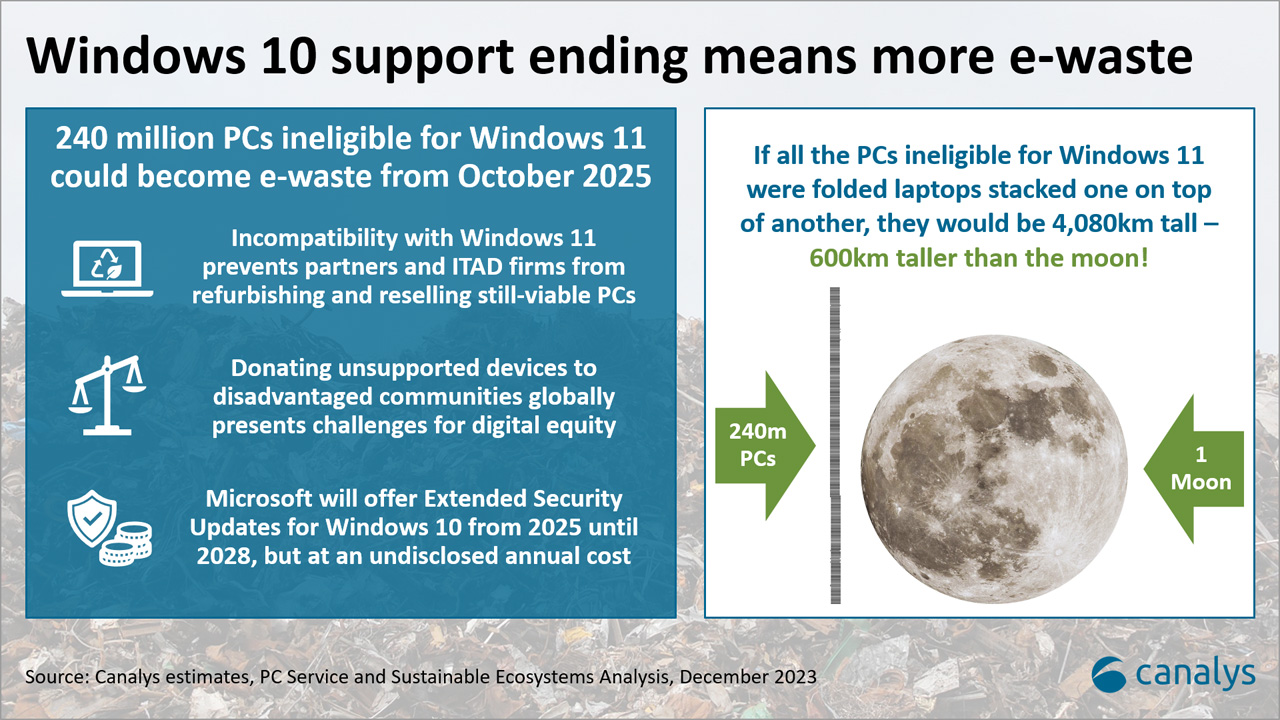The arrival of smarter smartphones
22 December 2023
Canalys is part of Informa PLC
This site is operated by a business or businesses owned by Informa PLC and all copyright resides with them. Informa PLC’s registered office is 5 Howick Place, London SW1P 1WG. Registered in England and Wales. Number 8860726.

Microsoft’s Windows 11 will help support a struggling PC market as customers prepare for another refresh cycle – but the termination of Windows 10 support could prevent hundreds of millions of devices from getting second lives, leaving many liable to end up in landfill.


Microsoft’s Windows 11 will help support a struggling PC market as customers prepare for another refresh cycle – but the termination of Windows 10 support could prevent hundreds of millions of devices from getting second lives, leaving many liable to end up in landfill.
At the end of a difficult year for the PC market, there is finally reason for optimism. Canalys expects the PC market to return to growth of 8% in 2024 as customers look to refresh the PCs of the pandemic era and new AI-capable devices emerge.
The availability of Windows 11 on newer PCs will also drive growth. But many millions of in-use devices lack the hardware requirements for Microsoft’s newest OS – preventing the channel from refurbishing these viable PCs for their second lives.
240 million PCs will become e-waste when Windows 10 support ends
Canalys estimates that in the nearly two-year period until Microsoft’s official end-of-support date for Windows 10 – 14 October 2025 – roughly a fifth of devices will become e-waste due to incompatibility with the Windows 11 OS. This equates to 240 million PCs. If these were all folded laptops, stacked one on top of another, they would make a pile 600km taller than the moon.
Most of these 240 million PCs, if in good condition, could at least be recycled, but their incompatibility with the latest supported version of Windows massively reduces their value for refurbishing and reselling. Realistically, landfill is still a common outcome for used PCs, regardless of the OS issue, but more sustainable ITAD options have never been more abundant. The channel now has extensive and growing capabilities for PC refurbishment – the Canalys 2023 sustainability survey found that 39% of partners already have capabilities for refurbishing and reselling secondhand devices.
Digital equity challenges in shifting devices with unsupported operating systems
Many of the 240 million PCs will still be usable for years to come, but demand for devices no longer supported by Microsoft will be minimal – even companies with the tightest of IT budgets will be deterred by the lack of free and continued security updates.
Charitable donations of these discarded PCs could maximize their usable lifespans – but if the industry wants to support digital equity, this is not viable or socially sustainable. In practice, digital equity means ensuring that disadvantaged and developing communities worldwide can access information technology and fully use and benefit from it. Giving second lives to these unsupported PCs is clearly the best option environmentally, but donating these devices will not advance the industry’s efforts to bridge the digital divide.
Microsoft responds with optional cybersecurity updates – at a cost
In early December, Microsoft issued a statement announcing that Extended Security Updates for Windows 10 will be available until October 2028 – albeit for a currently unspecified annual fee. This approach is not new for Microsoft, which also offered paid Extended Security Updates for Windows 7 and Windows 8.1 until January 2023.
Though the provision of extended support can prolong the lifespans of Windows 11-ineligible PCs, the cost of these security updates will likely be a barrier for many users. The pricing plans for Windows 7’s extended support began at US$25 per PC for the first year of support, quadrupling to US$100 annually in the third and final year of Extended Security Updates. If Microsoft pursues a similar pricing structure for Windows 10’s extended support, the more cost-effective option will be migration to newer, Windows 11-capable PCs – forcing older PCs onto the scrapheap.
Vendors have a responsibility to maximize device lifespans
The scale of the e-waste produced by the end of support for Windows 10 highlights the role of device vendors and OS vendors alike to maximize products’ usable lifespans. To facilitate the circular economy, OEMs must embed durability, repairability and recyclability into the design of their devices – and OS vendors must ensure these devices are usable and secure for as long as possible. Collectively, these efforts can support end users, partners and ITAD specialists in ensuring that devices are not discarded prematurely, but given a second chance through repair, redeployment, refurbishing and reselling.
But as it stands, there are no regulations to drive this change in the PC market – despite an upcoming EU regulation requiring smartphone and tablet vendors to offer functional and security updates for a set period after a device’s launch. In the meantime, cross-industry collaboration can be the only solution to the technology sector’s alarming and persistent e-waste problem.